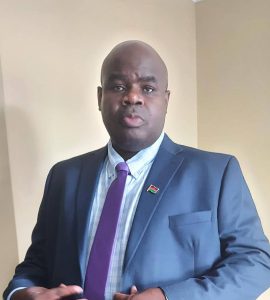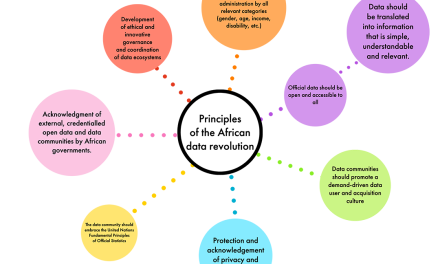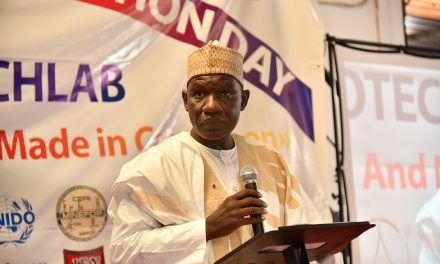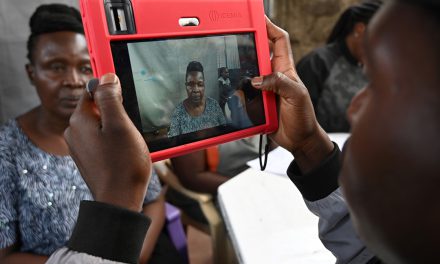The United Nations Africa Data Revolution report for 2018, among others, recommends the promotion of a culture shift around the importance and ownership of government data. This is in response to a common practice in many African countries where data custodians – statisticians, academia and policyholders – do not share their data with the private sector and/or their citizens. This means there are often gaps in the information necessary for making informed decisions.

A drone during a mapping exercise for cholera hotspots organised and funded by UNICEF (United Nations Children’s Fund) Malawi in Likuni, outside Lilongwe, on 27 January 2018. Photo: Amos Gumulira/AFP
The pressure is on across Africa for governments to implement policies that will enable them to achieve their sustainable development goals (SDGs), as set out in both the UN’s 2030 Agenda for Sustainable Development and the African Union’s Agenda 2063.
As an April 2021 Mo Ibrahim Foundation working paper, Bridging the policy-data gap in Africa, noted: “There is evidence that strong statistical capacity is a key enabler of good governance. Countries capable of producing high-quality statistics tend to perform better in delivering public goods and services to their citizens, which is the core objective of governance.”
But as Michael Kaiyatsa, the executive director for the Centre for Human Rights and Rehabilitation told Africa in Fact, “There is a lack of proper data analysis, a lack of quality data, and poor coordination amongst data collection systems and custodians. There’s plenty of data being produced, but it isn’t being fully utilised due to these factors.”
The result is that too many African citizens have to live with the consequences of poor or non-existent statistical collection and management, including development policy in sectors like health, urban planning and education, for example, that is too often based on inaccurate or patchy data. It is they who must bear the consequences of poor relationships and lack of coordination between data custodians, researchers, academia, statisticians, media and civil society organisations.
The Mo Ibrahim paper, while noting that the data and research community on the continent had undergone a huge transformation in recent years, said it is important that government statistical offices build relationships with academia and the private sector, and vice versa.
The situation in Malawi, where research funders determine where data is shared and how it is used, excluding the wider public and policy makers, is a good example of why these relationships are important.
The Institute of Public Opinion and Research (IPOR), a Malawian-based private research firm specialising in surveys, social science research, advisory and consulting services, said that plenty of data are produced in the country, but only a fraction of that has ever been.
“There are many organisations that have collected data that is never available to the Malawian public,” IPOR executive director, Professor Boniface Dulani, told Africa in Fact.

Professor Boniface Dulani. Photo: Josehine Chinele
The results of some research that his own organisation conducted had not been shared with Malawi because it was commissioned by stakeholders outside of the country. “Their priority isn’t dissemination within Malawi,” Prof Dulani said. “We have tried to solicit funding to do our own research projects, especially around elections, but we have been limited by [a lack of ] a donor.”
The Malawi National Statistical Office (NSO), the main government department responsible for collection and dissemination of official statistics, acknowledges that its research dissemination excluded key data users.
NSO public relations officer Samuel Chipokosa told Africa in Fact that the NSO did reach out to the line ministries and partners responsible for sector-specific data findings to provide them with the information, but data packaging was a major communication barrier. It was usually bulky and the line ministeries found it difficult to understand, so the data was not used as expected.
“Users usually want the data in a simplified format,” Chipokosa said. “We admit that there is a gap and we are working towards providing the data in a less tedious format.” The NSO, he added, was also in the process of providing data literacy, simplifying data by publishing information pamphlets, policy briefs and the use of graphic images for public consumption.
As the Malawi example illustrates, dissemination and literacy are important aspects of the data revolution. Data sharing is vital for transparency and good governance, promoting trust between government at every level, public institutions and the country’s citizens.
Since the media plays such an important role in promoting government transparency and building stronger democratic structures, it also has an important role to play in disseminating data. The Mo Ibrahim April 2021 report agrees, saying that: “Given their crucial role in informing the public, it is vital that journalists fully understand official statistics and can communicate them in a way that is comprehensible to non-statisticians while remaining accurate and precise. To achieve this, statisticians must also be able to communicate their findings clearly and succinctly without losing important detail.”
There are a few data-driven journalists but the media continues to play an important role in promoting government transparency, advocacy of marginalised communities and building stronger democratic structures. The Malawi chapter chairperson for the Media Institute for Southern Africa (Misa), Theresa Ndanga, points out that technical jargon in most research findings presents a major barrier for the media in informing the public of various study outcomes.
“Accessibility is mostly not an issue for the media but the interpretation of the language used always has been,” she said. “In the end, journalists end up just covering the research dissemination event without going deeper into the details of the findings. But there is also a need for openness on the part of researchers.”
Ndanga says that in most cases, the media focuses on holding public officers to account, without addressing data accountability in a broader sense. “We should also hold researchers to account for their data concerning health, agriculture and other sectors. We haven’t explored the area of questioning the findings in the public interest. Journalists should be encouraged to hold researchers to account.”
While media might have access to data that the general public does not, plenty of published academic research goes unreported to a wider audience because the media ignores it or does not realise it exists in the first place. Academics do not appear to be much interested. This has led to piles of published but undisseminated data in most academic institutions on the continent.
Doctoral candidate and sessional lecturer at the University of the Witwatersrand in South Africa Albert Sharra agrees that while academics could make more effort to share their research, there is also not enough interest from the media – and the wider public – in unused data stored within universities. “This, coupled with the already established lack of interest, contributes to the piling up of unused, unknown data at universities.”
Sharra agrees there is a lack of public interest in academic research, indicating that things work better if the research is done targeting the authorities, unlike ordinary Malawians. Academic journal articles, he says are mostly published online. This makes it hard for a person who hardly has something to survive on to access such information. The public libraries also rarely stock important books, research findings and academic journals.

Albert Sharra. Photo: Josephine Chinele
Ultimately, while accessible and reliable data is becoming indispensable to proper planning and policy making, electronic data stores represent a valuable national asset for African governments.
Sharra also pointed out that researchers who published research on commission by public companies did not make an extra effort to ensure their findings reached a wider audience. But without proper funding, the upskilling of employees and proper frameworks to facilitate data sharing, this valuable asset will be squandered.
[activecampaign form=1]
Josephine Chinele is multi-award-winning international journalist. She has worked as a news, features and investigative journalist for newspapers, radio and television platforms in Malawi, Tanzania and South Africa. Josephine has also been awarded several prestigious journalism fellowships in the area of HIV and AIDS, health and human rights among others. She is also a biomedical HIV prevention advocate.













